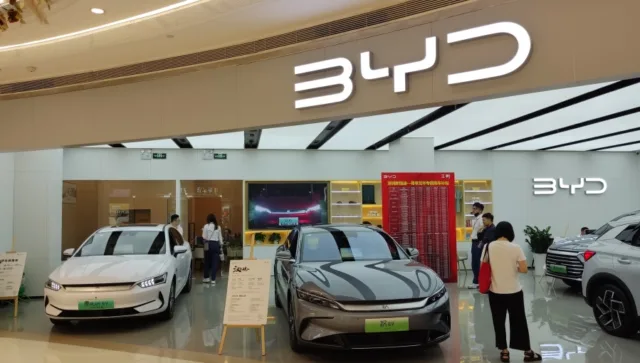
China’s electric vehicle (EV) giant BYD has shelved plans to build a major manufacturing plant in Mexico, citing geopolitical volatility and the current trade stance of the United States under President Donald Trump. The decision underscores the increasing vulnerability of Mexico’s automotive sector to external political disruptions and raises concerns about its short-term attractiveness as a production hub for foreign automakers.
Stella Li, Executive Vice-President of BYD, confirmed the decision during a company event in Bahia, Brazil, where BYD is launching its first production facility outside Asia. She told Bloomberg that while the company remains interested in expanding in the Americas, “geopolitical issues have a big impact on the automotive industry,” and that BYD will hold off on new investments until there is greater clarity.
The now-abandoned project was expected to involve an investment decision by late 2025, with plans to produce 150,000 vehicles annually and create 10,000 jobs. According to El Economista, BYD had narrowed down three possible locations in Mexico—one of which was Jalisco, where company representatives had already toured sites near Guadalajara.
The project’s collapse comes after months of friction between the US and China over trade practices, especially involving the automotive sector. Tensions escalated when the US International Trade Commission accused Chinese automakers of using Mexico as a backdoor to bypass American tariffs—prompting heightened scrutiny of all Chinese manufacturing activity in the region.
According to Financial Times, China’s Ministry of Commerce delayed approving BYD’s Mexican expansion over fears that the plant’s technology might become accessible to US authorities through supply chain proximity. This hesitation mirrored BYD’s own strategic caution: the firm halted its site scouting activities late last year to wait out the US election cycle and monitor shifts in trade policy.
Mexico’s President, Claudia Sheinbaum, confirmed in March that BYD had never formally submitted an investment offer. While BYD’s country head, Jorge Vallejo, had stated earlier in January that an announcement was imminent, the company never moved forward with a final decision.
The timing is especially damaging for Mexico, which is struggling with a cooling domestic automotive market. Vehicle sales in the country dropped by 5.9% in June compared to the same month last year—the third consecutive monthly decline—according to data from Mexico’s National Institute of Statistics (INEGI), reported by El Economista. This downturn, marked by weak consumer confidence and economic deceleration, compounds the uncertainty that global manufacturers face when considering Mexico as a regional base.
General Motors, the second-largest seller in the Mexican market, posted a 12% decline in sales for the month, while market leader Nissan saw stagnant growth. Meanwhile, several Chinese brands, including Chirey and Jetour, stopped reporting their figures entirely in recent months, signalling waning confidence or strategic withdrawal.
Despite the slowdown, the Mexican Automotive Dealers Association (AMDA) notes that sales remain above pre-pandemic levels, with June’s figures 8.7% higher than in the same month of 2019. Yet the outlook for the second half of 2025 remains subdued. AMDA now expects a fiercely competitive market, but one weighed down by economic stagnation and global production shifts.
This is not the first time international EV firms have pulled back from Mexican investments due to trade risk. In July 2024, Tesla CEO Elon Musk paused plans for a $5bn Gigafactory in Monterrey, citing similar concerns over US policy under President Trump. Unlike Tesla, which had signed formal agreements with Mexican authorities, BYD never reached that stage.
The missed opportunity is significant. BYD’s proposed plant would have targeted not only the Mexican domestic market, but also broader Latin America and potentially the US—a strategy that aligned with Mexico’s aspirations to become an EV manufacturing hub. More than 20 Mexican states had reportedly pitched sites for the plant.
While BYD insists its Mexico plans are only on hold, the decision marks another example of how unpredictable geopolitics and protectionist shifts are reshaping global manufacturing. With production in the Americas now deemed too risky by the world’s largest EV manufacturer, Mexico’s bet on electric vehicle-led reindustrialisation may require a rapid rethink.







